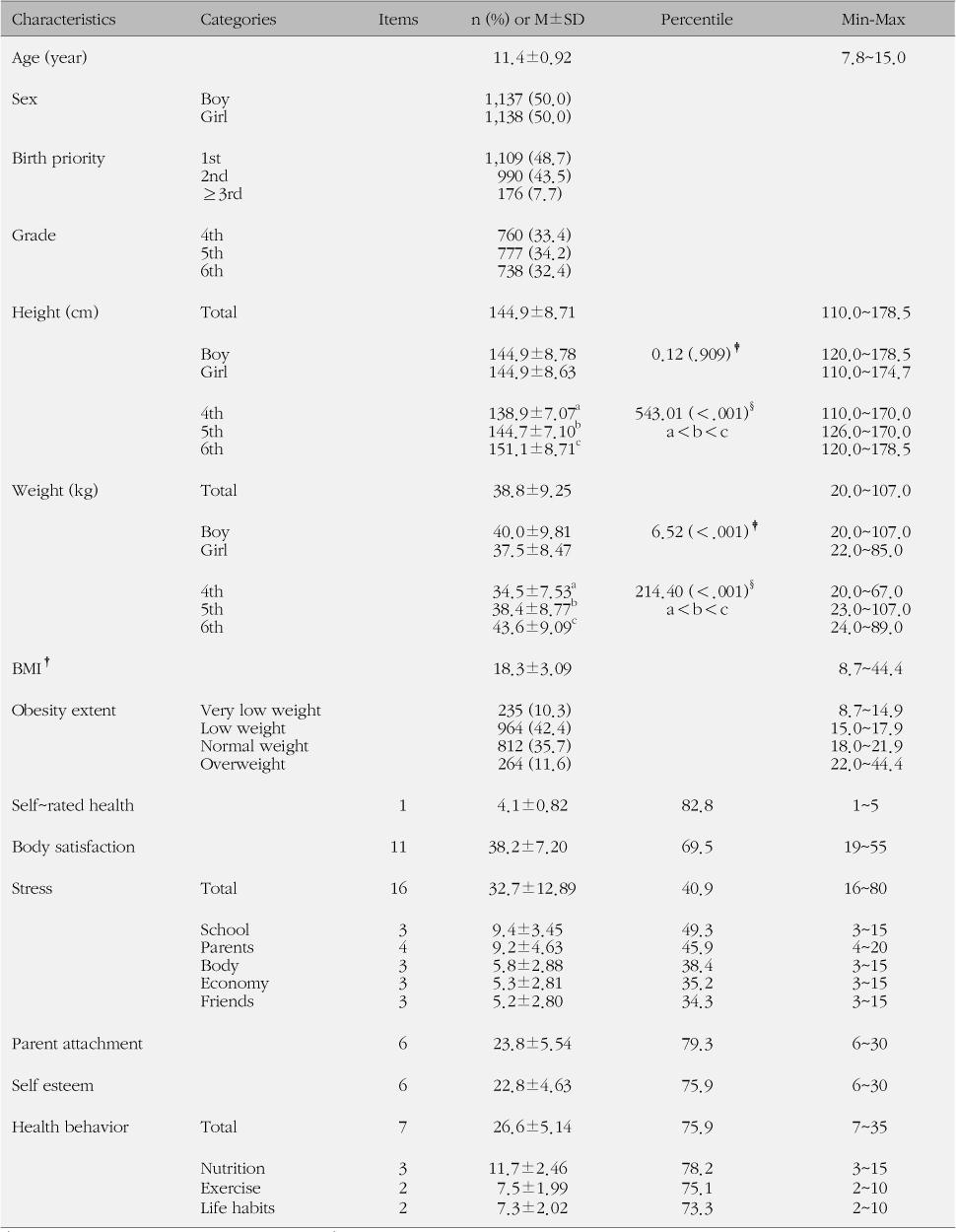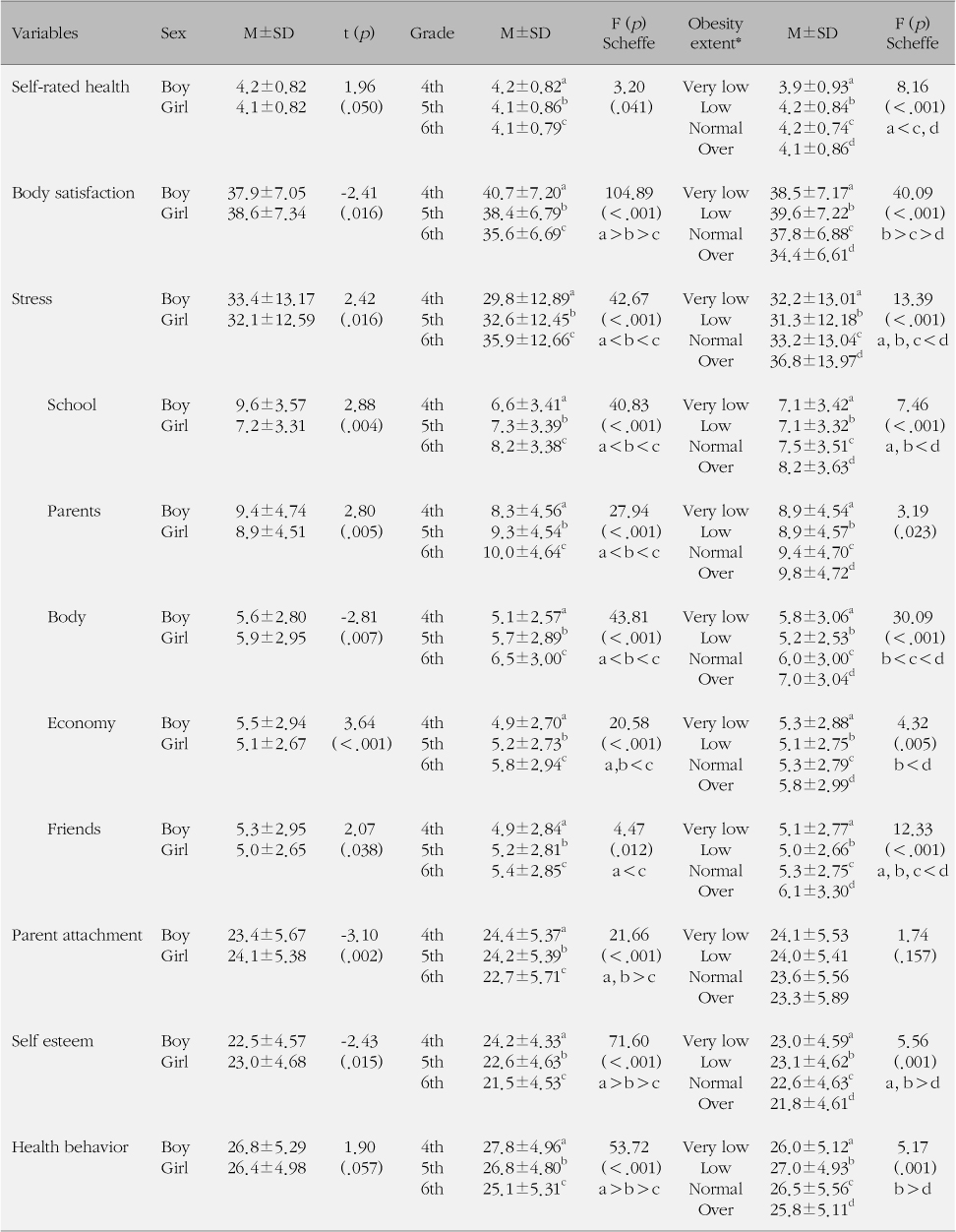Articles
- Page Path
- HOME > J Korean Acad Community Health Nurs > Volume 21(4); 2010 > Article
-
Original Article
- Factors Affecting the Health Behavior of Elementary School Children at a Late School Age
- Jina Oh
-
Journal of Korean Academy of Community Health Nursing 2014;21(4):458-467.
DOI: https://doi.org/10.12799/jkachn.2010.21.4.458
Published online: April 4, 2014
Associate Professor, Department of Nursing, Inje University · Institute for Health Science Research, Korea.
• Received: September 30, 2010 • Revised: December 14, 2010 • Accepted: December 15, 2010
© 2010 Korean Academy of Community Health Nursing
This is an Open Access article distributed under the terms of the Creative Commons Attribution Non-Commercial License (http://creativecommons.org/licenses/by-nc/3.0/) which permits unrestricted non-commercial use, distribution, and reproduction in any medium, provided the original work is properly cited.
- 615 Views
- 1 Download
- 7 Crossref
Abstract
-
Purpose
- This study was conducted in order to identify factors related to the health behavior in elementary school children at a late school age and to provide basic data to develop more concrete and practical applications for health promotion and disease prevention.
-
Methods
- The participants were 2,775 4th, 5th and 6th graders sampled from 10 elementary schools in Busan Metropolitan City and data were collected from 15th May to 30th June, 2010. The collected data were analyzed by mean, percentile, t-test, ANOVA, Pearson's correlation coefficient, and stepwise multiple regression using the SPSS/WIN 17.0 program.
-
Results
- The average percentiles for self-rated health, body satisfaction, stress, parent attachment, self-esteem, and health behavior were 82.8, 69.5, 40.9, 79.3, 75.9 and 75.9, respectively. There was significant relationship among the levels of self-rated health, body satisfaction, stress, parent attachment, self-esteem, and health behavior. Body satisfaction was the most powerful factor to the health behavior of elementary school children at a late school age, and was followed by parent attachment, self-rated health, self-esteem, and grade in order. These variables explained 26.6% of the total variance in health behavior.
-
Conclusion
- Health promotion behavior programs including body satisfaction and self-esteem elevation programs should be applied to children at home and in school and community. To achieve this, institutional and economic support should be continued.
- 1. Ainsworth MD. The development of infant-mother attachment. In the beginning readings on infancy. New York: Columbia University Press; 1982.
- 2. Armsden GC, Greenberg MT. The inventory of parent and peer attachment; Individual difference and their relationship to psychological well-being in adolescence. J Youth Adolesc. 1987;16(5):427–454. PubMed
- 3. Austin SB, Haines J, Veugelers PJ. Body satisfaction and body weight: Gender differences and sociodemographic determinants. BMC Public Health. 2009;9:313.ArticlePubMedPMCPDF
- 4. Banfield SS, McCabe MP. An evaluation of the construct of body image. Adolescence. 2002;37:373–393. PubMed
- 5. Bowlby J. Attachment and loss: attachment. 2nd ed. New York: Basic Books; 1982. Vol. 1.
- 6. Do KH. The effects of children's self-esteem, eating attitude and school adjustment on body image. J Elementary Educ. 2008;21(3):111–125.
- 7. Jung NK. An evaluation of children's body image and physical self-perceptions. Korean Soc Meas Eval Phys Edu Sports Sci. 2003;5(2):49–69.
- 8. Kim E, Hwang JY, Woo EK, Kim SS, Jo SA, Jo I. Body mass index cutoffs underweight, overweight, and obesity in South Korean schoolgirls. Obes Res. 2005;13(9):1510–1514. PubMed
- 9. Kim SH. A prediction model of health promotion behavior for school children. Seoul: Ewha Womans University; 2007. Unpublished doctoral dissertation.
- 10. Kim SH, Lee JH. Test of a hypothetical model for health promoting behavior in school-aged children. J Korean Acad Child Health Nurs. 2008;14(1):22–34.
- 11. Kim SJ, Yang SO, Jeong GH, Lee SH. Level of health promotion behavior practice in elementary school students. J Korean Acad Child Health Nurs. 2007;13(4):407–415.
- 12. Kim WC, Kim JJ, Park BW, Park SH, Song MS, Lee SU, et al. Modern statistics. 4th ed. Seoul: Youngchimoonwhasa; 2009.
- 13. Lee HY, Kim CN. The study of performance of health promoting behavior in elementary school students. J Korea Community Health Nurs Acad Soc. 2004;18(1):119–131.
- 14. Lee JI. A study on obese children's self-efficacy and health promotion behavior. Gyeongsan: Gyeongsan University; 2001. Unpublished doctoral dissertation.
- 15. McCormick CB, Kennedy JH. Parent-child attachment working models and self-esteem in adolescence. J Youth Adolesc. 1994;23(1):1–18. ArticlePDF
- 16. Min HY, Yoo AJ. The effects of perceived parental behavior and coping behaviors on parent-related stress in school aged children. J Korean Home Econ Assoc. 1999;37(9):1–12.
- 17. National Youth Policy Institute. Korean Youth Panel Survey. Seoul: National Youth Policy Institute; 2007.
- 18. Park EH. A study on the self-esteem & body satisfaction according to subjective body sizes in 5 & 6th elementary school children. Korean Parent Child Health J. 2008;11(1):1–9.
- 19. Park GS, Oh SH. A study on the relationship between self-efficacy and health promoting lifestyle profile of childhood obesity. Korean J Child Health Nurs. 2004;10(2):173–179.
- 20. Park HM, Moon ST, Yang JH. The effect of elementary school children's attachment on self-esteem and learning motivation. J Korean Pract Arts Educ. 2002;15(3):113–125.
- 21. Park WM, Cheon SM. A study on parent attachment, self-concept, self-efficacy and peer relationship of the 6th grade children in elementary school. Korean J Sch Psychol. 2008;5(1):41–59. Article
- 22. Park HK, Cho MY. '06-' 08 School health test result analysis. Seoul: Ministry of Education, Science and Technology; 2009, June.
- 23. Park JH, Choi TS. The effect of body image on self-esteem in adolescents. Korean J Play Ther. 2008;11(1):117–129.
- 24. Park MS. A study on the stress, health perception, and health promotion behavior of the late school-aged children. Seoul: Ewha Womans University; 2004. Unpublished master's thesis.
- 25. Pender NJ. Health promotion in nursing practice. 3rd ed. Connecticut: Appleton & Lange Stanford; 1996.
- 26. Raja SN, McGee R, Stanton WR. Perceived attachments to parent and peer and psychological well-being in adolescence. J Youth Adolesc. 1992;21(4):471–485. PubMed
- 27. Richards MH, Duckett E. The relationship of maternal employment to early adolescent daily experience with and without parents. Child Dev. 1994;65:225–236. ArticlePubMed
- 28. Yu MJ. The relationship between obesity index, body image, self-efficacy and health promoting behavior. Daegu: Daegu University; 2010. Unpublished master's thesis.
Figure & Data
References
Citations
Citations to this article as recorded by 

- Effects of Health Intentions and Health-promoting Behavior on Selfesteem
among School-aged Children in South Korea
Jin Kim, Ga Eul Jeon, Nam Hyun Cha
Current Pediatric Reviews.2023; 19(3): 304. CrossRef - Factors Affecting Health Behaviors in Late School-aged Children from Multicultural Families
Sangmi Lee
Child Health Nursing Research.2020; 26(1): 23. CrossRef - Structural Equation Model of Health Promotion Behaviors in Late School-aged Children: Based on the Theory of Planned Behavior
Ga Eul Jeon, Nam Hyun Cha
Child Health Nursing Research.2019; 25(4): 477. CrossRef - Physical Symptoms, Depression, and Related Factors of Late School-age Children in Seoul, Korea: The Mediating Role of Peer Relationships
Kyung-Sook Bang, Sungjae Kim, Kyungim Kang, Minkyung Song
Journal of Pediatric Nursing.2018; 43: e120. CrossRef - The Relationship between Perceived Health Status and Health Promoting Behaviors among Nursing Students
Se Hwa Hong
The Journal of Korean Academic Society of Nursing Education.2013; 19(1): 78. CrossRef - Relationship of Body Satisfaction, Self-rated Health, and Parent-Child Attachment to Health Behavior of Children as Perceived by 4th Grade Elementary School Students and Their Mothers
Jin-A Oh
Journal of Korean Academy of Child Health Nursing.2011; 17(3): 161. CrossRef - Breakfast Skipping and Related Factors in Children in Poverty
Kyung Ja June, Jin-Young Kim, Seungmi Park, Ji Yun Lee
Journal of Korean Academy of Community Health Nursing.2011; 22(2): 204. CrossRef

 KACHN
KACHN




 PubReader
PubReader Cite
Cite

